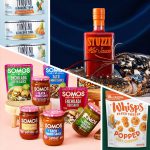B&G Acquires a Grocery Goliath with Green Giant Sale
Taking its ongoing acquisition campaign into a new section of the store, B&G Foods, Inc. announced today it had agreed to buy the venerable Green Giant and Le Suer vegetable brands from General Mills, Inc. The deal, valued at approximately $765 million in cash (subject to an inventory adjustment at closing) allows B&G to quickly expand past its core competency, in the shelf stable space to the frozen aisle.
B&G Foods has a long history of acquisitions (numbering over 25 in the last 18 years) which include Pirate Brands, Ortega and Polaner. B&G has substantially ramped up its acquisition efforts over the last five years.

On a conference call this morning, B&G President and CEO Robert Cantwell noted both the iconic nature of Green Giant and the fact that the brands have large shares of the market in the US and Canada. B&G also valued that the brands have a flexible supply chain and significant cash flow generation, he said.
Both analysts and Cantwell hinted that the pickup may lead to even more future acquisitions in the frozen space for B&G. It’s part of an ongoing reordering of some of the largest old-line food brands and companies from the Kraft/Heinz merger to the divestment of the Green Giant and his sidekick, Sprout, from the massive General Mills portfolio.
Recent articles and analyses have accused bigger brands of sticking too much with traditional flavor profiles and dishes as part of a frozen market downturn. Meanwhile, some smaller frozen brands that are more nimble and creative, such as Evol and Amy’s, have been heralded as heroes in the category.
Cantwell echoed this sentiment. More than once he painted a picture of Green Giant as a brand that has been allowed to languish and compared it to “an orphan in a large food company” that B&G can rescue.
“We also expect to leverage consumer trends to develop a comprehensive, long term, innovation pipeline within and outside of the frozen and canned vegetable categories with nutritious, better-for-you products that meet the needs of today’s consumer,” Cantwell said.
He also stated that B&G will be doubling marketing spend from the $15-$16 million General Mills was allocating, up to $30-$35 million annually. The majority of this marketing spend will go towards the frozen product line.
Green Giant is unique from other frozen brands in that they have a shelf stable product in addition to the frozen product: In Cantwell’s opinion, marketing the frozen product should help sales of the shelf stable products, as well.
To some this acquisition may seem unexpected given consumer desire for “fresh” foods and a decrease of center aisle shopping. A recent Nielsen report found that fresh produce vegetables generated $20 billion in sales in 2014 (and grew 5 percent compared to 2013), while frozen and canned vegetable sales declined. Nevertheless, frozen suppliers note that frozen vegetables can easily meet consumer needs for high quality produce and low carb, high fiber nutritious meal additions.
According to Nielsen, it’s just a question of converting them to frozen.
A copy of the full press release is below:
MINNEAPOLIS, Sept. 3, 2015 /PRNewswire/ — General Mills, Inc., (NYSE: GIS) announced today it has reached a definitive agreement to sell its Green Giant and Le Sueur vegetable businesses to B&G Foods, Inc., (NYSE: BGS) for approximately $765 million in cash, subject to an inventory adjustment at closing.
General Mills will continue to operate the Green Giant business in Europe and select other export markets under license from B&G Foods.
The sale reinforces General Mills’ strategic priority to shape its portfolio for growth, focusing its resources on the brands, categories, and geographic markets that have the greatest future growth opportunities.
The Green Giant and Le Sueur businesses included in the proposed transaction, comprised of the U.S., Canada, and select other markets, generated annual net sales of approximately $585 million in fiscal 2015.
The transaction, which is subject to regulatory approval, is expected to close by the end of the calendar year. General Mills expects to use the net proceeds for share repurchases and debt reduction. The company anticipates the transaction will be dilutive to fiscal 2016 earnings per share in the range of approximately 5 to 7 cents, excluding transaction costs and a one-time gain on the sale.
General Mills will provide additional details about the impact of the transaction when it reports its fiscal 2016 first-quarter results on September 22, 2015.
Rothschild acted as financial advisor to General Mills on the transaction.
About General Mills: General Mills is one of the world’s leading food companies, operating in more than 100 countries around the world. Its brands include Cheerios, Fiber One, Haagen-Dazs, Nature Valley, Yoplait, Betty Crocker, Pillsbury, Old El Paso, Wanchai Ferry, Yoki and more. Headquartered in Minneapolis, Minn., USA, General Mills had fiscal 2015 worldwide sales of US $18.7 billion, including the company’s US $1.1 billion proportionate share of joint-venture net sales.
This press release contains forward-looking statements within the meaning of the Private Securities Litigation Reform Act of 1995, including statements regarding the anticipated timing and completion of the transaction, the use of proceeds from the transaction and the impact of the transaction on future earnings per share. These forward-looking statements are based on facts and circumstances known to us as of the date the statements are made and are subject to risks and uncertainties that could cause actual results to be materially different from those set forth in such forward-looking statements, including but not limited to, obtaining necessary approvals and consents for the transaction, fulfillment of other transaction conditions, economic conditions, and overall business and capital allocation strategy. See “Risk Factors” in our fiscal 2015 Annual Report on Form 10-K filed with the Securities and Exchange Commission for additional information regarding these and other risks and uncertainties applicable to our business. The company assumes no obligation to publicly update any forward-looking statement.












